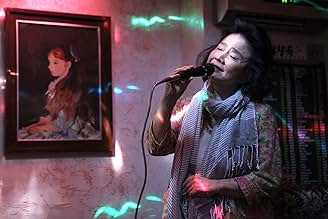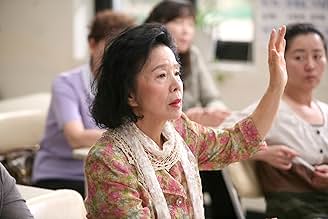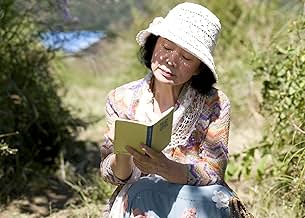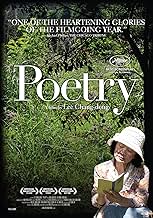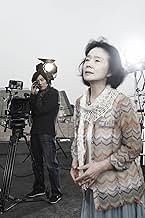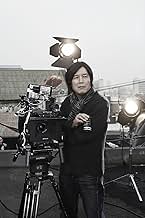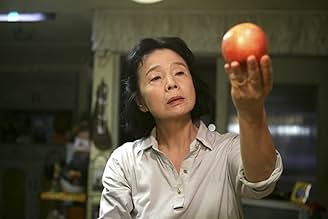IMDb-BEWERTUNG
7,8/10
14.255
IHRE BEWERTUNG
Eine sechzig Jahre alte Frau, die mit der Entdeckung eines abscheulichen Familienverbrechens und in den frühen Stadien der Alzheimer-Krankheit konfrontiert ist, findet Stärke und Sinn, wenn ... Alles lesenEine sechzig Jahre alte Frau, die mit der Entdeckung eines abscheulichen Familienverbrechens und in den frühen Stadien der Alzheimer-Krankheit konfrontiert ist, findet Stärke und Sinn, wenn sie sich in einer Gedichtklasse anmeldet.Eine sechzig Jahre alte Frau, die mit der Entdeckung eines abscheulichen Familienverbrechens und in den frühen Stadien der Alzheimer-Krankheit konfrontiert ist, findet Stärke und Sinn, wenn sie sich in einer Gedichtklasse anmeldet.
- Auszeichnungen
- 27 Gewinne & 25 Nominierungen insgesamt
Empfohlene Bewertungen
There's an outstanding outward composure pervading this movie, to the point that it seems impossible not to feel in the end a sense of calm, although the cruelty of some situations. This is probably a typical feature of all oriental pictures and culture as well, but here it is most evident, almost therapeutic. The protagonist is a small, meek, cheerfully dressed, sixty-something woman, in the early stages of Alzheimer's, who has to look after her troublesome grandson, dramatically connected with a shocking event in the small Korean city where they live. It's a slow movie, which leaves ample scope to the unsaid and the unwritten, but dripping with strong and deep humanity. Mija reveals such determination in her simple and peaceful going on, holding on, she proves the real strength of real strong people, that strength that does not need any evident outward demonstrations, but only the inner will of a meek nature who continues to see the beauty of a flower or the perfection of an apple, and the beauty of poetry, of course, against the ugliness of men (and here the ugliness of a male chauvinist society is to be underlined). The movie reveals such delicacy, such subtlety and tact while approaching the most disturbing topics, that we as viewers can manage everything, feeling a kind of respect towards us, and feeling also grateful for that. Great work by the director Lee Chang-dong then, and standing ovation for Yun Jung-hee for her intense, poignant, stunning interpretation of Mija. The last shots on her finally achieved poem are petrifying and soothing at the same time, showing an incredible emotional intensity. These are movies that should reach the big screen more often and more widely.
The theme of old age and illness find a new positive essence in poetry. A device to have even the elderly explore life in new and interesting ways. The excellent screenplay and brilliant directing from Chang-Dong Lee combined with an engaged ensemble cast and revealing cinematography, give place for an intimate interaction. The poets and aspiring poets fit well in this story of inner discovery. The inspiration is difficult to come by and external events will accentuate the duality of seeing life as an observer while also being an essential actor.
The multi-layered story has poetry, dialogue, imagery and much time for reflection. The film builds up to the last poem "Agnes' Song" by Mija Yang (the protagonist) which is powerful and perfect. Accentuated by it's accompanying images, it brings out life, beauty, sadness, acceptance, connection and so much more. The editing is especially effective here, but is extraordinary throughout. The ending confirms that the collections of individually intense and intelligent scenes witnessed transcends by transposing and transforming Mija and ultimately the viewer.
Hopefully this will inspire a perhaps much needed poetic view of this hypermodern world which can barely watch deliberate thoughtful meaningful measured movies like this, much less find and read a poem. Maybe this artistic beckon will even encourage someone to write one.
The multi-layered story has poetry, dialogue, imagery and much time for reflection. The film builds up to the last poem "Agnes' Song" by Mija Yang (the protagonist) which is powerful and perfect. Accentuated by it's accompanying images, it brings out life, beauty, sadness, acceptance, connection and so much more. The editing is especially effective here, but is extraordinary throughout. The ending confirms that the collections of individually intense and intelligent scenes witnessed transcends by transposing and transforming Mija and ultimately the viewer.
Hopefully this will inspire a perhaps much needed poetic view of this hypermodern world which can barely watch deliberate thoughtful meaningful measured movies like this, much less find and read a poem. Maybe this artistic beckon will even encourage someone to write one.
Poetry (2010)
Steady and stealthy, this film proposes to be as lyrical and compact as a poem, but then it keeps going and ends up larger and more impressive than you'd expect. And the acting by leading female actress, the Korean star Jeong-hie Yun, is startling and nuanced, a great performance.
At the heart of the plot are two plots. The first is the title line—elderly Mija has decided to learn how to write poetry, so she attends a class (filled with younger students). The second is about a sex crime—a gang rape it turns out—by her grandson, who she is raising alone. The two are nearly opposites in so many ways we see how life itself balances the beautiful and ugly, and responsibility and indifference. In a larger way, "Poetry" is about contemporary life in Korea, and the interactions of ordinary people in extreme situations will be revealing to many outside of Korea.
It's hard to overstate how well this movie pulls off something socially serious and yet makes it all understated and almost matter of fact. There are these several lines of thought that keep going throughout, and that don't quite converge until the very end, which is both tragic (truly) and a bit mysterious. What exactly is the implication of that last scene on the bridge, and the water that shows nothing? It hearkens to the beginning, of course, but we have our main character at hand.
In that sense, it's a brilliant, almost perfect evocation of contemporary Korea on the most normal, middle class level. Lovely and loving, and cold and brutal. And it shows the glib sexism of the men there, much like everywhere at various times. And how to survive you sometimes have to just proceed. And then, of course, sometimes you do not survive.
Steady and stealthy, this film proposes to be as lyrical and compact as a poem, but then it keeps going and ends up larger and more impressive than you'd expect. And the acting by leading female actress, the Korean star Jeong-hie Yun, is startling and nuanced, a great performance.
At the heart of the plot are two plots. The first is the title line—elderly Mija has decided to learn how to write poetry, so she attends a class (filled with younger students). The second is about a sex crime—a gang rape it turns out—by her grandson, who she is raising alone. The two are nearly opposites in so many ways we see how life itself balances the beautiful and ugly, and responsibility and indifference. In a larger way, "Poetry" is about contemporary life in Korea, and the interactions of ordinary people in extreme situations will be revealing to many outside of Korea.
It's hard to overstate how well this movie pulls off something socially serious and yet makes it all understated and almost matter of fact. There are these several lines of thought that keep going throughout, and that don't quite converge until the very end, which is both tragic (truly) and a bit mysterious. What exactly is the implication of that last scene on the bridge, and the water that shows nothing? It hearkens to the beginning, of course, but we have our main character at hand.
In that sense, it's a brilliant, almost perfect evocation of contemporary Korea on the most normal, middle class level. Lovely and loving, and cold and brutal. And it shows the glib sexism of the men there, much like everywhere at various times. And how to survive you sometimes have to just proceed. And then, of course, sometimes you do not survive.
POETRY (dir. Chang-dong Lee) POETRY is a slow-moving character drama which is disarmingly powerful, yet haunting and meditative. Mija is a sixty-six year old suffering from early onset Alzheimer's disease who lives in a rural Korean town with her indolent teen aged grandson, Jongwook. In an attempt to stimulate her cognitive abilities, she enrolls in a poetry class. Things are looking up until she learns that her grandson was involved in the suicide of one of his classmates. Jongwook and some of his friends had been sexually abusing a classmate, and this drove the young girl to take her life. Soon Mija is contacted by the fathers of the boys and learns that they want to pay the girl's mother a large sum of money to keep her from going to the authorities. In her poetry class at the community center Mija learns that in order to create poetry one must learn, 'to observe', 'to notice', and 'to witness'. The need for a heightened awareness or sensibility becomes the compelling dichotomy of the film. We observe that the fathers only focus on the ramifications of the incident on the lives of their sons, while Mija becomes moved and deeply empathizes with the loss of this innocent young girl to her family and the community. And, in the end Mija forces her grandson to face up to his responsibility, and she also constructs a loving and heartfelt poetic eulogy for the young girl. And, in a remarkable way of relating these two crucial events, the character of Mija is not even present as the actions unfold. Director, Chang-dong Lee, delivers a wonderful film which touches on a wide range of difficult subjects; poetry, dementia, sexual abuse and suicide, and casts an elderly semi-retired Korean actress as the star of the film. However, these kinds of mature topics and deliberate presentation are out of favor in Hollywood and unpopular with contemporary film audiences. I'm afraid that this film will never garner much commercial success, but if you take the time 'to witness', you will enjoy a truly rewarding cinematic experience.
Lee Chang Dong has always been a favorite Korean director of mine. His films, including "Poetry," have a subtle yet captivating force. "Poetry" is not for the average film viewer, but is for more mature audiences who are not afraid to confront life as it is and the existential aspects of life in general. The film is an exploration of complex human conditions that people can often find boring. But "Poetry" is inarguably meaningful and deep in its own way. It presents life realistically, but also paves way for finding positive little things within the worst conditions. "Poetry" is a film that will make you think in a way that almost no Hollywood movie can. Certainly, it is a powerful film as well. The only problem is that the majority of the population can misunderstand a film such as this one. It is a film that requires effort on the part of the audience to think and interpret the film for what it is. But once the purpose of the film is appreciated, it is a wonderful film for what it's worth. Go and watch it. It's a film that can change the way you look at everyday things.
Wusstest du schon
- WissenswertesThe idea for the film had its origin in a real-life case where a small town schoolgirl had been raped by a gang of teenage boys. When director Lee Chang-dong heard about the incident, it made an impact on him, although he hadn't been interested in basing a film on the actual events. Later, during a visit in Japan, Lee saw a television program in his hotel room. The program was edited entirely from relaxing shots of nature, "a peaceful river, birds flying, fishermen on the sea with soft new-age music in the background," and a vision for a possible feature film started to form. "Suddenly, it reminded me of that horrible incident, and the word 'poetry' and the image of a 60-year old woman came up in my mind."
- VerbindungenFeatured in At the Movies: Cannes Film Festival 2010 (2010)
Top-Auswahl
Melde dich zum Bewerten an und greife auf die Watchlist für personalisierte Empfehlungen zu.
- How long is Poetry?Powered by Alexa
Details
Box Office
- Budget
- 1.300.000.000 ₩ (geschätzt)
- Bruttoertrag in den USA und Kanada
- 356.149 $
- Eröffnungswochenende in den USA und in Kanada
- 18.900 $
- 13. Feb. 2011
- Weltweiter Bruttoertrag
- 2.539.040 $
- Laufzeit2 Stunden 19 Minuten
- Farbe
- Sound-Mix
- Seitenverhältnis
- 1.85 : 1
Zu dieser Seite beitragen
Bearbeitung vorschlagen oder fehlenden Inhalt hinzufügen



